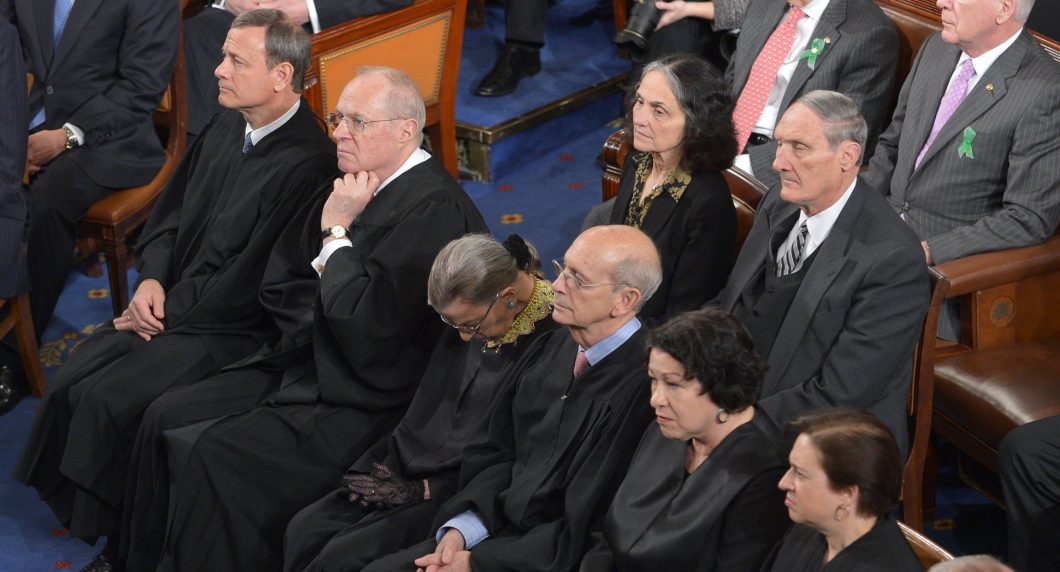The Book of Judges
The restrained vision of the federal judiciary that has for some time dominated the jurisprudence of right-leaning American legal theorists and lawyers in this country is now under fire. In writings both academic and popular, many libertarian and classical liberal scholars clamor for the supposed symmetry of substantive due process or the bold recovery of an expansive listing of natural rights that is, we are told, embodied in the 9th Amendment, and the Privileges or Immunities Clause of the Fourteenth Amendment. Even George Will has reversed his own prior position on judicial restraint to now favor “judicial engagement” to protect so-called non-fundamental liberties and unenumerated rights from the rule of majorities, or what some might call the carefully qualified majorities of our republican constitution.
We’ve featured a number of these concepts here in reviews and podcasts: David Bernstein’s Rehabilitating Lochner, and Clint Bolick’s Death’s Grip stand out in my mind.
One wonders if the debate, though, on the status of natural rights in the Constitution and the press for their recognition by the federal judiciary is merely a symptom of the fundamental displacement of Madisonian constitutionalism. If so, we might see the judicial engagement camp trying to pull liberty from the wreckage of a Progressive, centralized Constitution that in divers ways abandoned the structural guarantees of individual freedom its Framers gave it. In short, these scholars are better seen as entrepreneurs of a new constitutional order, as opposed to being involved in a recovery effort of a Lost Constitution.
As such, their aims are admirable, but the attempt to vindicate a natural rights constitutionalism, generated and specified by the judiciary, invites its own set of troubles. We can start with the basic point that Greg Weiner has made repeatedly in this space: Don’t put a judicial philosophy out there that can be appealed to, as will happen, by liberal activists. (What is the basis, they will ask, for saying your discoveries under the 9th and 14th Amendments count and ours don’t?)
Natural rights jurisprudence is dogged by the problem of how do judges specify these rights so as to not introduce virtually indefinable state powers that are needed to effectuate them? Indeed, open-ended powers bring forth open-ended means that leave us even more removed from a Constitution that was predicated on protecting liberties through its structural design of enumerated powers and competing branches and layers of government. So we all have rights, but abstract rights, Hamilton warns, “furnish to men disposed to usurp, a plausible pretense for claiming that power.” And Justice Kennedy has rushed in to assure us that Hamilton knew of what he spoke.
What are we to make of Justice Kennedy’s Progressive rendering of liberty in the 14th Amendment in decisions like Lawrence v. Texas, where he observes that those who framed the Amendment were unaware of the unfolding dimensions of liberty that subsequent generations would discover? Here, Justice Kennedy proclaims himself the soothsayer of liberty in the evolving national conscience. We have rights according to general moral criteria, in this case “liberty” in the 14th Amendment’s Due Process Clause, but they are indefinite, and we don’t know their shape until the Court provides the detail. There’s no law there.
Russell Hittinger walks us through this thicket of issues in his 1998 essay “Natural Rights, Under-Specified Rights, and Bills of Rights.” Hittinger is an originalist who, unlike Robert Bork, believes in natural law and that positive law must effectuate certain norms in order to be classified as law. But, he says, natural law recognizes the somewhat arbitrary allocations of authority that any constitutional regime must make. Natural law might be baked into your law, but the deeper question is, who has the authority to render judgment? Hittinger notes that before joining the Supreme Court, Clarence Thomas, rightly argued in his confirmation hearing (much to then-Senator Biden’s consternation) that while he believed in natural rights, he had no judicial authority to impose judgment on them as law.
Our Constitution’s Framers resisted not only the constitutionalization of natural rights rhetoric, Hittinger notes, they even resisted a Bill of Rights, until compromise demanded recognition of it to secure necessary ratification votes. Significantly, the federal government, as observed in Federalist 45, is a government of delegated powers, few and defined. The states retain powers that are “numerous and indefinable.” Federalist 51 speaks to this issue with stark language:
“In the compound republic of America, the power surrendered by the people is first divided between two distinct governments. . . . Hence a double security arises to the rights of the people.”
And so a government of few and defined powers presents the problem of power not as a moral issue, but as a basic question: Does it have the power? Secondly, the concept of enumerated powers should take off the table a range of considerations that were appropriately left to the states. In short, Hittinger states “Rather than listing all the moral norms that ought to guide the use of legislative, executive, and judicial powers, the Constitution tries to state as precisely as possible who has authority over a certain scope of objects.”
What changed? We lost the federal government of enumerated and limited powers. The rights of citizens changed also, and with it, our view of what best protects our liberties: the Bill of Rights versus the Constitution as a Bill of Rights. Hittinger notes that Justice Jackson’s opinion in West Virginia v. Barnette makes this very point:
These principles grew in soil which also produced a philosophy that the individual was the center of society, that his liberty was attainable through mere absence of governmental restraints, and that government should be entrusted with few controls and only the mildest supervision over men’s affairs. We must transplant these rights to a soil in which the laissez-faire concept or principle of non-interference has withered at least as to economic affairs, and social advancements are increasingly sought through closer integration of society and through expanded and strengthened governmental controls.
Not being able to find a particular constitutional text that could protect Jehovah Witness students in public school from participation in a flag ceremony, and having lost the confrontation to limit the powers of the government to what had been delegated, the “Court decided to limit power by a moral argument keyed to individual rights.”
Jackson noted in this opinion that the Bill of Rights contains “majestic generalities.” And that, we can note, is where the danger emerges for the rule of law. Once the judiciary has arrogated to itself the power of proclaiming new rights in the Constitution, it must then specify these rights, making itself their arbiter. But we might reason that a government that will not limit itself to the instructions it has already received in a written Constitution is even less likely to take advice on what it decides to consider natural rights. Moreover, rights created by the judiciary are also subject to being discarded when the going gets tough. When governmental power clashes with these rights, and it inevitably will, then the latter has to go.
The problem with natural rights discourse, Hittinger argues, is that it tends to create rights antithetical to the rule of law; contributes to the formulation of vague propositions about justice, and fails to give clear instructions to government on the limitations of its powers. Again, we’ll go to Justice Kennedy—the man who holds liberty in the balance, some say—to make the point:
[A]t the heart of liberty is the right to define one’s own concept of existence, of meaning, of the universe, and of the mystery of human life. Beliefs about these matters could not define the attributes of personhood were they formed under compulsion of the State.
This reasoning is unlimited. It eviscerates law, is unspecified and open to numerous interpretations, and, most dangerously, unleashes the power of government to secure its sheer unbounded claims. I know, I know, the so-called “Mystery Passage” is almost too outlandish to adduce, but the possibilities it reveals are the warp and woof of natural rights jurisprudence.
Rather than enlist in this project, and its perils, we do better to rearticulate that, however paradoxical it may seem, liberty flows out of the constraints in the very design of the Constitution. That road is a difficult one—making sense of a paradox is not for amateurs— but it avoids the near-certainty of the arrival of confusion and danger that flow from a judiciary creating and articulating rights by its own lights.


